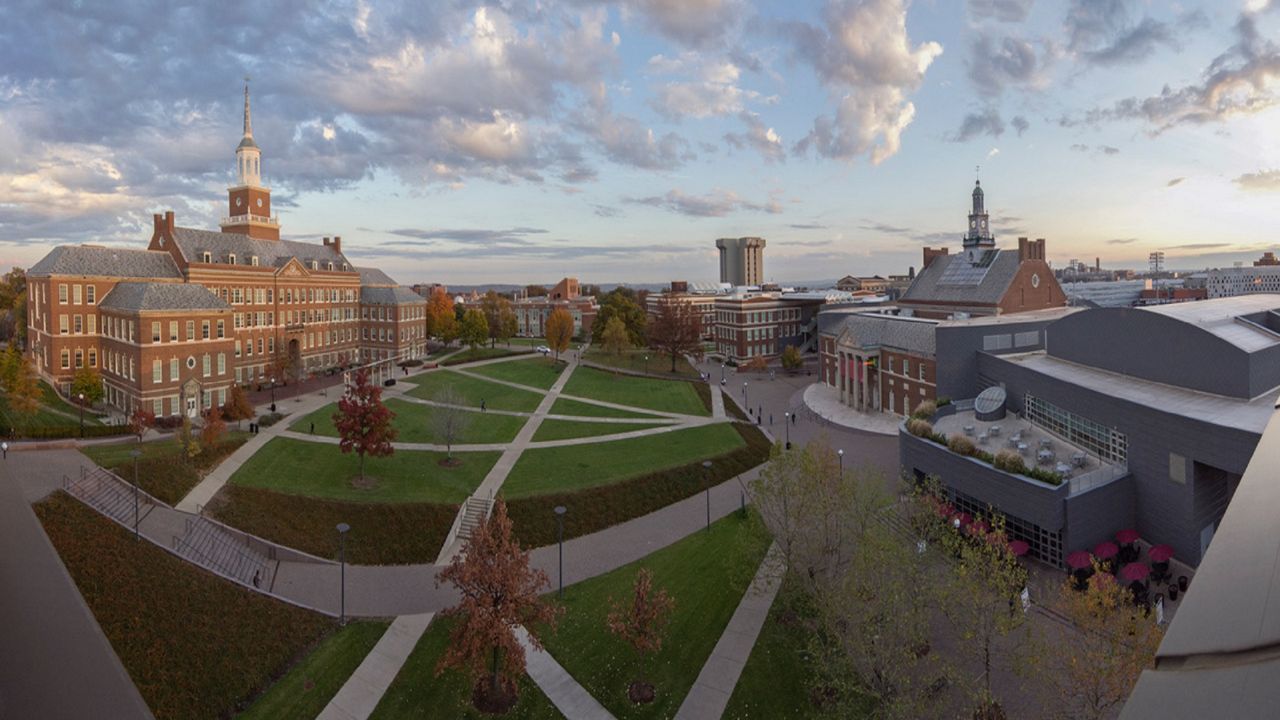CINCINNATI — The University of Cincinnati once again expects a record number of students this fall. While increased numbers would usually represent a good thing, UC has run into at least one related problem: It’s run out of room for students who want to live on campus.
What You Need To Know
- The University of Cincinnati is working to help find enough on-campus dorm rooms for first-year students
- UC has offered upperclassmen financial incentives to move into private ownly residences, or UC managed properties off campus
- The housing shortage is being blamed on several factors, including more returning students and local first-year students wanting to live on campus
- There are about 700 students who are guaranteed housing who are still awaiting their room assignment, according to a UC spokesperson
UC Housing is working with upperclassmen to help free up dorm space for freshmen and first-year students, according to UC Vice Provost Jack Miner, who oversees enrollment management.
The University of Cincinnati expects to have roughly 48,000 students across its three campuses this fall – UC Blue Ash College, UC Clermont College and its main campus in Cincinnati’s Clifton Heights neighborhood.

It has more than 7,500 university-managed rooms available, Miner said. But all of those rooms are full.
As of Wednesday, UC still had about 700 qualified students who are guaranteed housing but still haven’t received a specific room assignment, Miner said. He expects those students to receive room assignments in the “next couple of weeks.”
The main campus is expecting the largest class of first-year students in the university’s history when classes begin in late August, Miner said. But he cited other factors for the housing shortage as well. One of them is an “unprecedented demand” for university housing from students of all class levels, Miner said.
More than 2,000 sophomores, juniors and seniors have requested university housing, per UC data.
There’s also a large number of new students from the Cincinnati area who’ve requested campus housing, Miner said.
UC is without one of its largest dorms this semester, Calhoun Hall, a prominent, multi-story facility in the heart of campus.
“The construction was planned for, and the impact on our housing supply was anticipated,” Miner said. “Once the residence hall is renovated and comes back online, it will house nearly 800 students.”
Plans call for that hall to reopen in the spring.
Because of the on-campus housing shortage, UC has been working with returning students — sophomores, juniors and seniors — to convince them to move off campus to privately owned residences, or UC managed apartments outside what’s known as the “campus core.”
UC has offered continuing or returning students two incentive packages to convince them to move off campus, Miner said.
One offer would allow students to move to the CP Cincy apartment complex managed by UC that’s just outside of campus. The complex — which offers two- through four-bedroom units — is in the 100 block of E. McMillan St. That’s about a ¾-mile drive to the heart of campus, or a half-mile walk.
“The price offered to students for that location is less expensive for students than other campus housing, resulting in a $2,200 savings for students,” Miner wrote in a statement. He noted students living at CP Cincy would have access to a campus shuttle.
The university also offered a financial package to students to leave UC managed housing and move into privately owned housing. That deal included a “$2,500 incentive and free on-campus parking” for the fall semester, Miner said.
“After fall semester, the university will work with students to stay in the temporary housing or relocate to more traditional dorms,” Miner said. “If the students stay in off-campus housing, services like shuttles and parking passes will continue to be offered.”
The incentive process is ongoing so final details about costs and the management related to those costs aren’t available yet, according to a spokesperson for UC.

The goal of the incentive program, Miner said, is for students to take one of these options to open up more space on campus for first-year students.
“Every year since I have been here, (UC) has gotten record enrollment so I definitely think they could have planned for this better,” Emma Hanners, a UC senior. “I know there are about a million other variables, but it just seems preventable.”
UC has “tried many times” to get the Hershey, Pa. native to back out of her housing contract, she added.
Hanners described the first offer from UC as a “$1,500 scholarship for the fall semester” and being “put up” in the off-campus apartment complex. The idea of needing to take a shuttle to class wasn’t appealing to her.
She didn’t think finding privately owned off-campus housing was realistic, given the fact the fall term starts in a few weeks.
“With that short of notice, it would be almost impossible to find somewhere else to live,” Hanners said. “Not only that, but with how crazy rent is right now, $2,500 is not enough money to cover a semester.”
The money wasn’t really a factor in Hanners’ decision to turn down the university’s offers. She’s on a full-ride scholarship, she said, so the incentives “weren’t that enticing.”
Going through UC Housing for her apartment also makes her scholarship situation “easier to figure out,” she added, because tuition, housing and other costs come on the same bill from the university.
Hanners, who turns 21 before the start of the fall term Aug. 22., has lived in on-campus or university supported housing her entire UC career. She just enjoys the ease of campus living and being around other students.
Last year, she lived in what’s known as Campus Recreation Center Hall, on the MainStreet area of UC’s main campus. It’s connected to the school’s recreation space and CenterCourt dining hall. She’s living in a university affiliated apartment building through UC Housing this fall. She plans to graduate next spring.
“Living on campus because it is incredibly convenient,” she added. “Scholarship aside, everything is right there. I can easily walk to classes and everything else I need is either a short walk or drive away. It is also not far from where I work, which is in Over-the-Rhine.”
UC Housing is still finalizing student living situations for the upcoming fall term, so Miner couldn’t provide details on how many upperclassmen have accepted the incentive.
Miner said the university plans to review its housing strategy to help ensure situations like this don’t happen again in the future. This review aims to prioritize on-campus housing for first-year students, Miner said. His goal is to ensure those students can “build peer relationships and become familiar with the campus area.”



